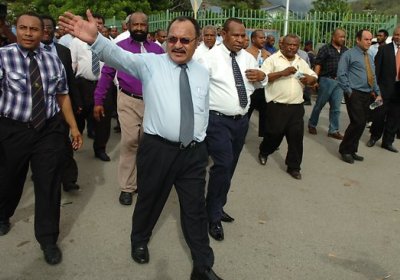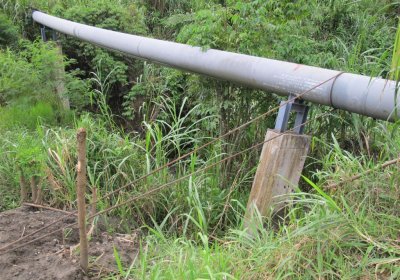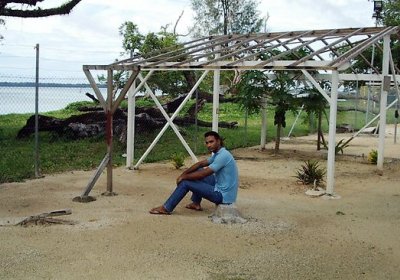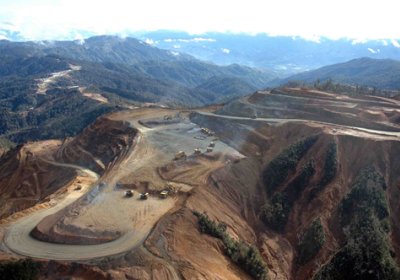The Papua New Guinean government has backed down in the face of a society-wide revolt over its new power to suspend judges. Prime Minister Peter O'Neill said the law would not be implemented until public consultations were carried out.
Thousands of students from the University of PNG rallied in Port Moresby on March 23. Students said in a statement that the law undermines the constitution by removing the separation between the government and courts.
Papua New Guinea
Tensions were high after a prominent supporter of the controversial Ramu nickel mine near Madang in Papua New Guinea died suddenly on January 3.
This comes after the PNG Supreme Court rejected an appeal on December 22 against the decision to allow the Ramu mine operators to dump 100 million tonnes of toxic mine tailings into Basamuk Bay over 20 years.
The role of notorious Malaysian-owned logging company Rimbunan Hijau (RH) is in the spotlight after Greenpeace activists blockaded one of its ships in Papua New Guinea on October 24.
Greenpeace was supporting about 200 local landowners from West Pomio, in New Britain, who were protesting against what they say was illegal logging by RH, AAP said on October 24.
Forty-thousand hectares of land was leased to RH — operating under a front company called Gilford — for 99 years for a palm oil plantation, without the consent of all landowners.
Federal Labor MP Anna Burke captured the Gillard government’s increasingly right-wing refugee policy when she said plans to reopen the Manus Island detention centre in Papua New Guinea would be “going back to something we said we wouldn’t do, which is the Pacific solution”.
Burke told ABC news on August 15 she had raised concerns in caucus about an overseas detention centre as well as the “Malaysia solution”, which faces a legal challenge in the High Court and could also be subject to a parliamentary inquiry.
Papua New Guinea's National Court ruled in favour of the owners of the controversial Ramu nickel mine in Madang on July 26, allowing the dumping of millions of tonnes of mine waste into the sea.
The dumping will devastate the Basamuk Bay area, putting the environment and people's lives at risk. It is a key area for biodiversity and is vital for the livelihood and food security of the local community.
The government of Papua New Guinea has been awarded Greenpeace’s “Golden Chainsaw” award in response to its corrupt, anti-environment forestry policies.
In a report released on October 25, the environmental advocacy organisation said PNG should not be allowed to take part in the controversial Reduced Emissions from Deforestation and Degradation (REDD) carbon trading program until “safeguards for biodiversity and indigenous and landowners’ rights and ending the corruption and illegal logging” are in place.
Owners of the Hidden Valley gold mine in Morobe province, Papua New Guinea, have tried to silence critics of the environmental damage created during the mine’s construction, Little Green Palai said on October 25.
Members of campaign group Union of Watut River Communities (UoWRC) have been issued restraining orders by owners Morobe Mining Joint Venture (MMJV). The owners demanded they stop spreading information about the mine's impact on the community and environment, the article said.
More than 100 landowners from the Madang Province of Papua New Guinea have said they want to join a court battle to stop millions of tonnes of mine waste being dumped into the sea, the Ramu Nickel Mine Watch website said on October 17.
The challenge was launched by 37 landowners, with others indicating their intent to join the case.
The fight against the dumping of toxic waste off the coast of Madang in Papua New Guinea suffered a setback when a court injunction against the Ramu nickel mine, which is building a pipe to dump its waste into the ocean, was reversed.
The injunction was dropped after the three remaining plaintiffs pulled out of the case against the US$1.4 billion Chinese-owned mine, the September 24 Sydney Morning Herald said.
BHP's annual general meeting on September 26 was disrupted by protests against environmental destruction by the company's Ok Tedi mine in Papua New Guinea.
- Previous page
- Page 5








